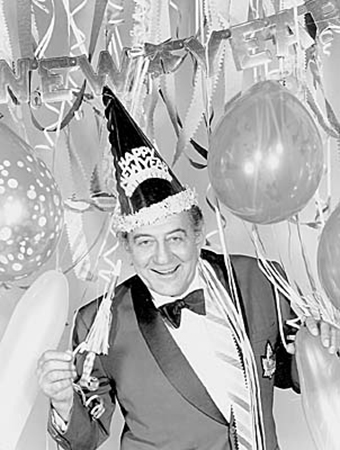Why We Sing “Auld Lang Syne” on New Year’s Eve
 This tradition is mostly thanks to Guy Lombardo and the Royal Canadian Band. While their work is largely unknown to those born in the last few decades, the band has sold over 300 million records to date. Guy Lombardo himself has three stars on the Hollywood Walk of Fame, and he was once the “Dick Clark” of New Years before Clark and his “New Year’s Rockin’ Eve,” attempting to appeal to younger audiences, started supplanting “Mr. New Year’s Eve,” Guy Lombardo.
This tradition is mostly thanks to Guy Lombardo and the Royal Canadian Band. While their work is largely unknown to those born in the last few decades, the band has sold over 300 million records to date. Guy Lombardo himself has three stars on the Hollywood Walk of Fame, and he was once the “Dick Clark” of New Years before Clark and his “New Year’s Rockin’ Eve,” attempting to appeal to younger audiences, started supplanting “Mr. New Year’s Eve,” Guy Lombardo.
It was in 1929 that Guy Lombardo and his band took the stage at the Roosevelt Hotel in New York City on New Year’s Eve. Their performance that night was being broadcast on the radio, before midnight Eastern-time on CBS, then after on NBC radio.
At midnight, as a transition between the broadcasts, the song they chose to play was an old Scottish folk song Lombardo had first heard from Scottish immigrants in Ontario. The song was Auld Lang Syne.
Previous to this, there are several documented instances of others singing this song on New Year’s Eve, going all the way back to the mid-nineteenth century, but it wasn’t anywhere close to the staple it would soon be after Lombardo’s performance.
The next year, and every year thereafter, all the way to 1976, with Lombardo dying at the age of 75 in 1977, they played it at midnight on New Year’s Eve at first broadcast out on the radio and later on TV. Thanks to “Mr. New Year’s Eve” and his band, it’s still tradition to this day.
If you liked this article, you might also enjoy our new popular podcast, The BrainFood Show (iTunes, Spotify, Google Play Music, Feed), as well as:
- Why We “Drop” the Ball on New Year’s Eve
- Why Is It Illegal to Remove Your Mattress and Pillow Tags?
- Why Do Asian Nations Use Chopsticks?
- Why Greenland is an Island and Australia is a Continent
- 99 Other Great “Why” Articles Along with This One in Our Book: The Wise Book of Whys
Bonus Fact:
It is often said that the song, Auld Lang Syne, was written by famed eighteenth century poet/songwriter, “Scotland’s Favorite Son” -Robert Burns. However, Burns never claimed to have written the song -in fact, quite the opposite. When he submitted it to the Scots Musical Museum, he included a note stating:
The following song, an old song, of the olden times, and which has never been in print, nor even in manuscript until I took it down from an old man’s singing, is enough to recommend any air.
The song was first published in 1788, and later a slightly modified version was published in Thomson’s Select Songs of Scotland in 1799, three years after Burns’ death.
The title, roughly translated to modern English, literally means “old long since,” but more figuratively means, “Times Gone By” or “Times Long Past.” It is simply a song about remembering old friends and the times spent with them. Burns set the lyrics to a traditional Scottish ditty called Can Ye Labour Lea.
Expand for References| Share the Knowledge! |
|





I think the better article would have been why do people (try to) sing Auld Lang Syne when hardly nobody knows the words!!
This song always reminds me of old episodes of The Little Rascals!
Hi Dave,
I really enjoy your articles. I sent a question last month and never got a response. Do you have your articles in voice? While I don’t always have time to read them, I would love to hear them while going and coming from work
Thank you for your wonderful articles.
@Maricela: We have about 400 of them in vocal form in the podcast (see link at the top of the page). We’re also on YouTube with a few hundred of them and rising every day. If you have YouTube red, you can more or less use the YouTube channel as a podcast as Youtube red lets you shut off your screen, but keeps the audio going.
Auld Lang Syne has been sung in Scotland for almost three hundred years! It was sung and heard from the crowds
who lined the docks and the jeties for departing ships taking emigrants to the New Worlds (Canada, US Australia and beyond) and is heard at every gathering of Rabbie Burns dinners, world wide every January 25th, the Birthday of the poet. Even more so than on New Year’s Eve.
I have a question about another new year tradition.
In the southern US it’s traditional to eat black eye peas on new year day for good luck in the new year. How where and when did this start.
Thanks,